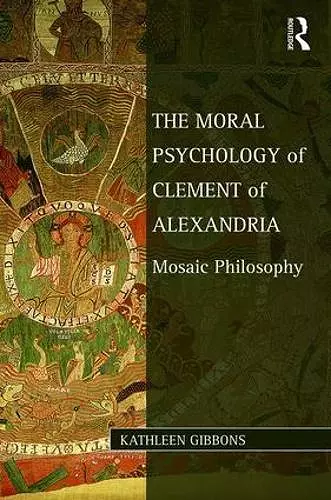The Moral Psychology of Clement of Alexandria
Mosaic Philosophy
Format:Hardback
Publisher:Taylor & Francis Ltd
Published:12th Sep '16
Currently unavailable, and unfortunately no date known when it will be back
This hardback is available in another edition too:
- Paperback£42.99(9780367880521)

In The Moral Psychology of Clement of Alexandria, Kathleen Gibbons proposes a new approach to Clement’s moral philosophy and explores how his construction of Christianity’s relationship with Jewishness informed, and was informed by, his philosophical project. As one of the earliest Christian philosophers, Clement’s work has alternatively been treated as important for understanding the history of relations between Christianity and Judaism and between Christianity and pagan philosophy. This study argues that an adequate examination of his significance for the one requires an adequate examination of his significance for the other.
While the ancient claim that the writings of Moses were read by the philosophical schools was found in Jewish, Christian, and pagan authors, Gibbons demonstrates that Clement’s use of this claim shapes not only his justification of his authorial project, but also his philosophical argumentation. In explaining what he took to be the cosmological, metaphysical, and ethical implications of the doctrine that the supreme God is a lawgiver, Clement provided the theoretical justifications for his views on a range of issues that included martyrdom, sexual asceticism, the status of the law of Moses, and the relationship between divine providence and human autonomy. By contextualizing Clement’s discussions of volition against wider Greco-Roman debates about self-determination, it becomes possible to reinterpret the invocation of “free will” in early Christian heresiological discourse as part of a larger dispute about what human autonomy requires.
The study of ‘free will’ as a question in moral psychology lies at the heart of this compelling study of Clement of Alexandria, but Gibbons’ discussion ranges much more widely, tracing themes in ethics, cosmology and metaphysics. In doing so, Gibbons reveals just how extensively, and how creatively, Clement engaged with contemporary philosophical thought in his construction of Christian identity. It is remarkable, and regrettable, how little serious attention has been paid to Clement until now: this book shows both theologians and students of ancient philosophy how much they have to learn from him.
- George Boys-Stones, Durham University, UK
Kathleen Gibbons demonstrates that Clement’s eclectic philosophical method is far more elaborate than has been commonly thought, since Clement not only construes key Christian doctrines through the lens of relevant pagan philosophical positions, especially Platonist and Stoic, but this construal amounts in turn to a distinct positioning within the contemporary philosophical debate. Gibbons’ book is a very welcome addition to the new appreciation of the philosophical character of early Christianity and should be read by students of late ancient philosophy and of early Christianity alike.
- George Karamanolis, University of Vienna, Austria
Gibbons’ monograph is ... worthy of the attention of not only Clement specialists, but patrologists more generally, as well as those in the field of ancient philosophy. It brings together in an illuminating way the too-often separate worlds of ancient philosophy and patristics, and situates the development of Christian ideas of providence and free will clearly within the context of ancient Platonic and Stoic thought ... Its clearest market will be for those in the field of patristics, but it is also one of the more successful efforts at linking the often too-separate worlds of early Christianity and ancient philosophy, and will be
ISBN: 9781472454447
Dimensions: unknown
Weight: 430g
208 pages